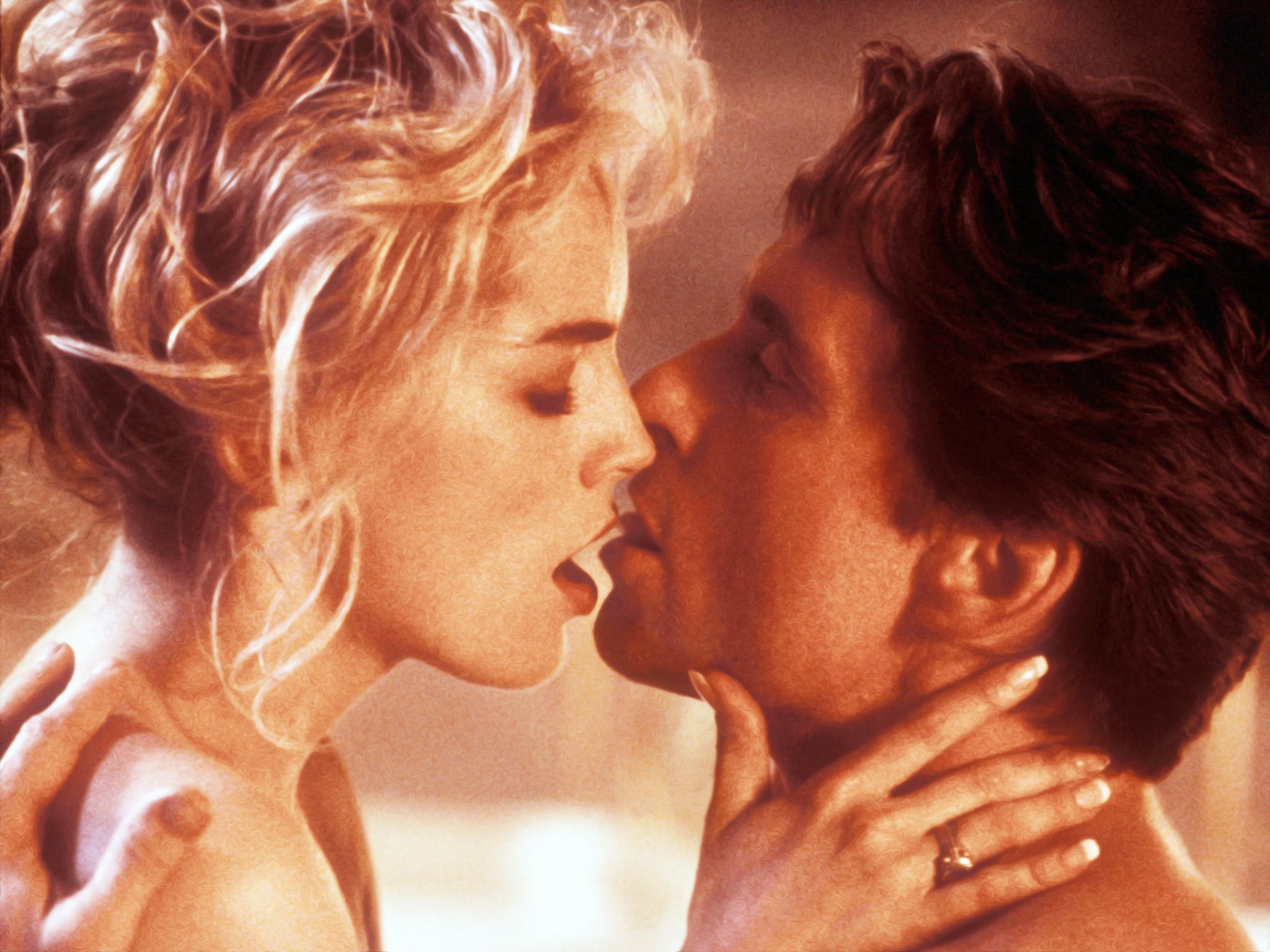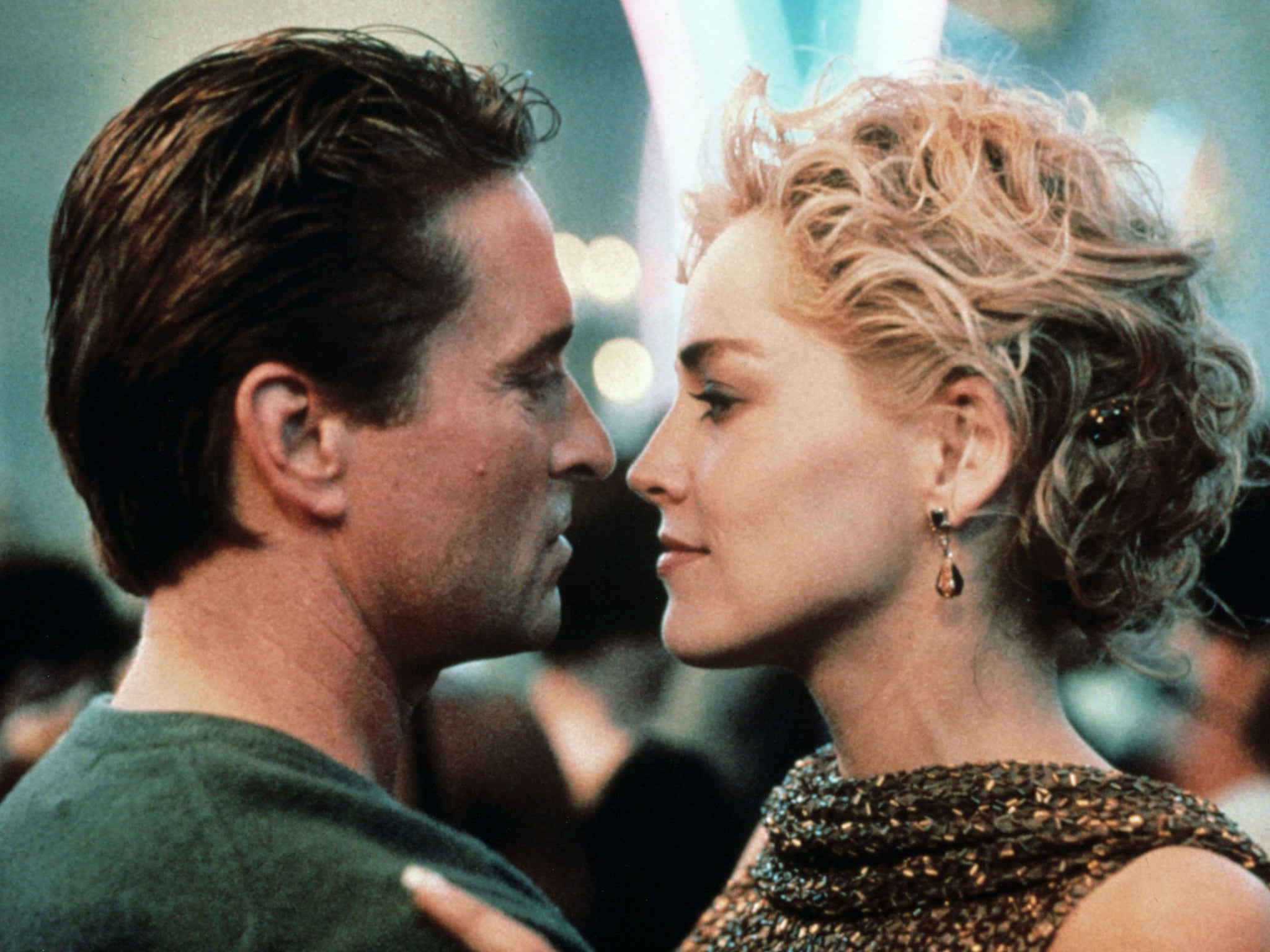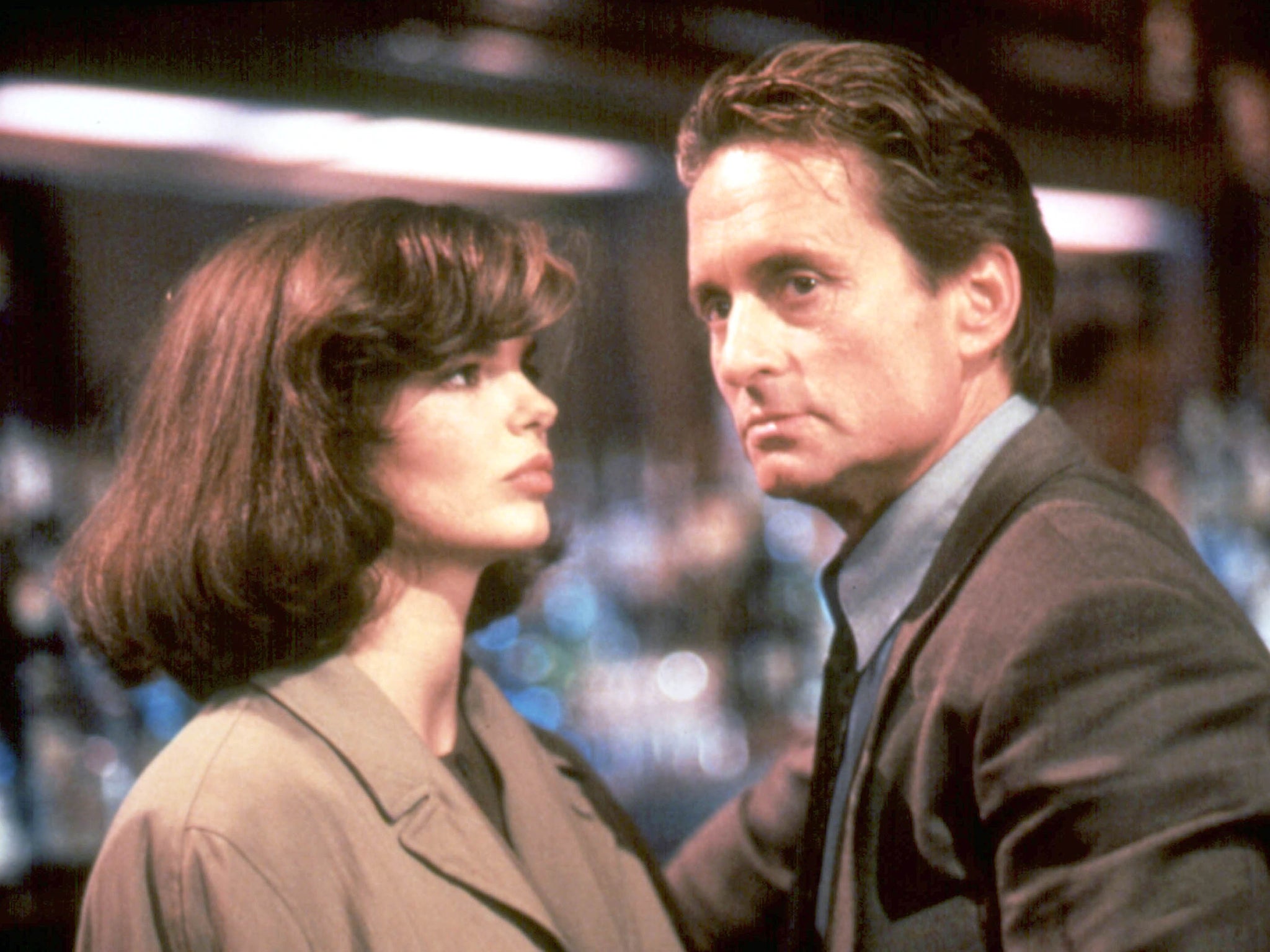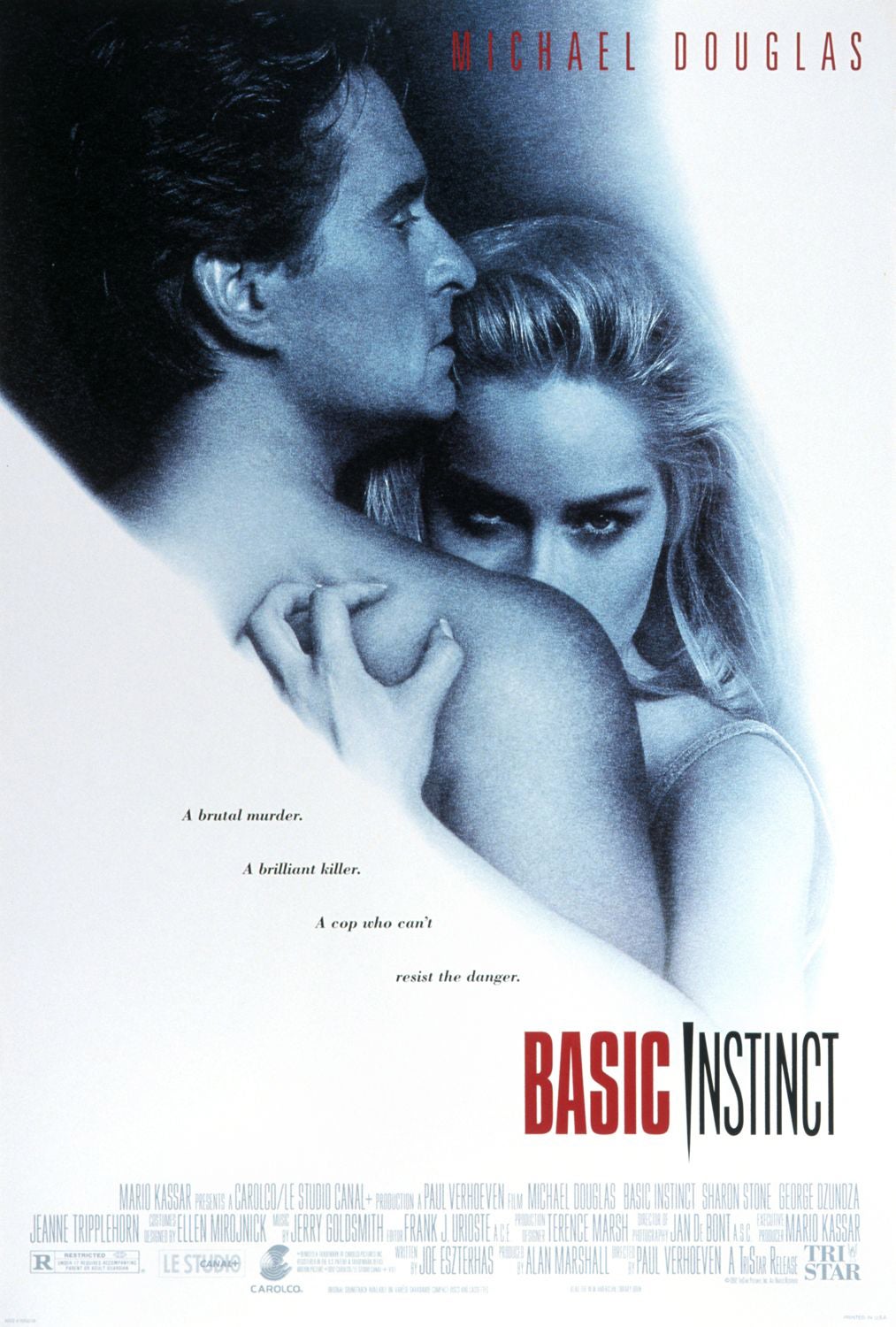‘People were afraid of it’: Basic Instinct and the scandalous making of a zeitgeist-shifting bonkbuster
Three decades ago, Paul Verhoeven directed Michael Douglas and Sharon Stone in an erotic thriller so shocking, so violent and so sexually provocative that culture at large was never the same, writes Tom Fordy

Basic Instinct was scandalous – and long before Sharon Stone sat down for questioning, uncrossed her legs, and made the sexually charged neo-noir the hottest movie of 1992. Months after screenwriter Joe Eszterhas had sold the script for $3m (£2.2m) after spending just 13 days writing it, he and director Paul Verhoeven embarked on a much-publicised bust-up. At one point, Eszterhas later claimed, he threatened to punch Verhoeven out. The cause of the friction? Apparent script changes. “I don’t know what,” laughs screenwriter Gary Goldman, who worked on later drafts. “More lesbianism or something!”
Basic Instinct, which was released in the UK 30 years ago on 8 May, was perfect fodder for Verhoeven, whose films – including RoboCop, Total Recall, and Showgirls – deal in extremes: profanity, violence, sex. “I think sex is one of the most important things in life, isn’t it?” he said in a promotional interview. Leading man Michael Douglas, meanwhile, was on a sensational run: Wall Street, Fatal Attraction, and a year later Falling Down. Toxic masculinity was his forte.
After Eszterhas and producer Irwin Winkler left the project – they’d protested Verhoeven’s desire to show unclothed body parts in “various stages of excitement” – Verhoeven invited Goldman (who wrote Total Recall) to work on the Basic Instinct script. Like everyone else at the time, Goldman loved it, particularly its villain: trashy crime novelist and all-round temptress Catherine Tramell. When her boyfriend is murdered with an ice pick mid-coitus, Tramell becomes prime suspect. The murder is also identical to one described in one of her books. “It’s either a copycat crime or she’s using her book as an alibi,” Goldman recalls. “It’s devilishly clever.”
Douglas’s character is detective Nick Curran, a recovering addict who’s undergoing therapy and an internal affairs investigation – the result of an accidental shooting. Tramell soon gets her claws into him – literally at one point – by manipulating, framing, and seducing him. Within just minutes of meeting her, Douglas’s cop is back on the cigarettes and booze.
Rumours of ramped-up sex scenes was just the first in a series of scandals that plagued the film’s production and its release. Gay rights activists picketed the film over its depiction of bisexual characters – its femme fatale was the latest in a “long line of lesbian psychotics,” said one protestor – while tabloids lapped up the film’s explicit sexuality. Playing Tramell, and peering over Douglas’s shoulder on billboards everywhere, Sharon Stone held a grip over the cultural, sexual zeitgeist. Controversy continued even last year, when Stone claimed in her memoir, The Beauty of Living Twice, that she was tricked into filming the movie’s notorious upskirt scene. It remains a cultural shorthand for scandal. Just last month, Labour deputy Angela Rayner condemned accusations by unnamed Tory sources to the Daily Mail that she’d used a “Basic Instinct ploy” to distract Boris Johnson with her legs during PMQs.
Back in 1991, Stone was eager to play Tramell, but at first couldn’t even get a copy of the script. Her manager had to break into the studio offices to nab a copy, jimmying the door with a credit card. Even then it took months of pestering the filmmakers with phone calls. In her memoir, the actor recalled that she was struggling to land decent movie roles because – according to industry lingo – she wasn’t “f***kable”. “Sharon was probably the first person that Paul tested,” Goldman recalls. “We had just worked with her on Total Recall – she was terrific in that movie and beautiful. She was somewhat like Catherine Tramell. She really is smart and assertive and ballsy. We knew she’d be great. But she wasn’t a big enough star.”
Sex was always a big part of the script, but the interrogation scene and the crossing of the legs? That was Paul Verhoeven
Douglas refused to even screentest with her. Basic Instinct was a risk – sexual, subversive, violent – and not one he wanted to take alone. Douglas wanted another star name up there on the billboards. “There were people who were afraid to take the part because it was so sexual,” says Goldman. Michelle Pfeiffer, Kim Basinger, Meg Ryan and Geena Davis were among the actors who reportedly turned it down. It’s little wonder why. A quick glance at the storyboard sketches proves eye-popping – they’re positively pornographic. Verhoeven was upfront about wanting full-frontal. “There was no negotiation about the nudity,” he said in a making-of documentary.
As for Stone’s casting, Douglas eventually relented. Her memoir recalled a line producer – “an older, kind of dodgy man” – telling her after she’d been cast: “You were not our first choice, Karen. No, you were not even the second or the third. You were the 13th choice for this film.” That older, dodgy line producer continued to call her “Karen” throughout production – though he managed to remember her actual name when she was later nominated for awards.
The sexual content of Basic Instinct was a hot topic even before production. “I know the more sensitive scenes will be handled with total integrity,” Stone told the press after being cast. Newspapers made a point of reporting that she was “32 and single”. Stone later admitted that she was tormented playing Tramell, plagued by nightmares and sleepwalking into her car on two occasions.
There’s a contradiction at the dark, sultry heart of Basic Instinct. Both Stone and her character were scrutinised over their brazen sexuality, and Stone filmed scenes that are impossible to imagine in a mainstream film now (indeed, gratuitous sex scenes, an absolute staple at one time, have mostly died a death in the years since Basic Instinct’s release), but Tramell was ahead of the curve.

“Sharon plays a magisterial genius,” says Goldman. “She’s in control of every situation. I don’t think there had been a character like that before. She totally owns her sexuality. She has money, she’s smart, and gets what she wants. It struck everyone as being a quantum leap forward in depicting a woman who could do anything a man could do.”
In true noir style, Basic Instinct is a phallic, Freudian nightmare. While Douglas’s cop has his gun confiscated, Tramell is on the loose, thrusting her penetrating ice pick – or threatening to – into every man she can get her hands on. Her biggest power play comes during the film’s most notorious scene: uncrossing her legs – revealing no underwear – while under police interrogation. It was Verhoeven’s idea. “Sex was always a big part of it,” says Goldman about the original screenplay. “But the interrogation scene and other things that are the real trademarks of it now – the crossing of the legs – that was Paul.”
In her memoir, Stone claimed Verhoeven had asked her to remove her underwear for the scene, because he could see a flash of white in the shot. He assured her that all the audiences would see is a shadow. She saw playback of the footage and – in the pre-digital age – it looked fine. Stone saw the scene properly at a preview screening. She described storming into the projection booth and slapped Verhoeven across the face. Verhoeven has denied the story, calling Stone’s version of events “nonsense”. But Stone was talking to the press even back in 1992 about how the scene was more explicit than she’d signed up for.
Jeanne Tripplehorn, who plays Curran’s possibly deranged psychologist, Dr Beth Garner, has also recalled how her own sex scene with Douglas – sickeningly violent 30 years on – was rougher than originally described to her. “Once I was on the set, I could see Paul’s new storyboards and realised what was happening,” Tripplehorn told Entertainment Weekly in 1993. “Before we filmed the thing, I was so nervous I was laughing uncontrollably. But I just followed the script and it was fine – well, except for the bump on my head I got from slamming it against the wall so many times.”

The film’s central sex scene – “the f*** of the century” as Curran dubs it in the film, and which Douglas still calls it now – took several days to shoot. Verhoeven recalled how he asked Stone to promise to do whatever he asked, then shook hands on it. With most of the crew removed from the set, cinematographer Jan de Bont got into bed with Stone and Douglas to film the scenes. “I don’t film like a voyeur,” he later said. “I film like somebody who happens to be there, who’s like this partner with them.”
Shot in San Francisco, the fabulous heart of California’s gay community, the Basic Instinct script was read by members of GLAAD (the Gay & Lesbian Alliance Against Defamation) and the activist group Queer Nation. Upset by the depiction of Tramell and her lesbian lover, Roxy (Leilani Sarelle) – both murderers either killed or tamed by Douglas’s hetero cop – the groups campaigned to get the film rewritten and met with a studio representative. Some of their proposed changes included Douglas’s character being made a lesbian, ideally played by Kathleen Turner, and the character saying, “A lot of the best people I’ve met in this town are gay.”
The National Organisation for Women joined protests against the film for being “so blatant in its misogyny it is like a lynching… [the message] is that women are dangerous and smart women can’t be trusted.” Gay activists picketed the production, interfering with equipment, lighting, and making a general racket. A restraining order was filed and protestors were arrested. They resorted to ruining the film with spoilers instead, naming their campaign “Catherine did it”.

“I really couldn’t understand it,” says Goldman. “I didn’t think that was a problem. If they had legitimate grievances and we had written a script that was offensive, I think we would have said, ‘Oh my god, shall we cut that out?’ but really there was nothing. We felt it was an undeserved nuisance.” Verhoeven, a native Dutchman with a progressive European attitude, believed that Basic Instinct was pro-gay but also saw the fun in the controversy. It was a “nice war” he said.
Most receptive to changes in the script was, ironically, original screenwriter Joe Eszterhas, who lived in San Francisco. “Eszterhas, who likes publicity, was kind of aligning with these people against his own movie,” recalls Goldman. “I guess because he had a grudge against it for being kicked off.” But there was a reconciliation with Eszterhas. As Goldman explains, the script had actually been hard to rewrite, so they’d more or less gone back to shooting Eszterhas’s version. When they showed Eszterhas the shooting script, he was suspicious. “It was so much like the original that he thought we were lying to him – like we had given him a ringer!” laughs Goldman.
Media anticipation for the film was either rampantly turned-on or unable to cope with its sheer sexuality. Stone’s sex life became a major story (“No knickers love shock for Sharon” went one headline), while tabloids devoted column inches to how many pairs of knickers were torn off Tripplehorn, as well as how many orgasms-per-minute viewers could expect from Stone.

Basic Instinct premiered in Los Angeles on 18 March, 1992. Opening night protests soon dissipated and the film arrived in the UK two months later. Reviews were tinged with misogyny. “Sharon Stone can act! Who knew?” wrote one US critic. The Sunday Times warned that it would chip away viewers’ humanity, and The Sunday Telegraph called it a “barely disguised slasher-and-porn” film. But Basic Instinct was also the fourth biggest hit of 1992, with a worldwide box office of $352.9m (£268m).
The film made Stone a star – she’d be nominated for an Oscar for Martin Scorsese’s Casino four years later – but perpetual association with Catherine Tramell also had a damaging effect. As she said in the documentary Sex, Death & Stone: “In my personal life, I’ve been aggressed so much as though I am that character. It made my life so difficult – so painfully, dangerously, horribly difficult. I’ve had to pay for that in devastating ways.”
Watched now, Basic Instinct is pure, joyous trash – even Verhoeven conceded that it’s a “nonsense movie” – but elevated by the sheer quality of its filmmaking: Jerry Goldsmith’s swirling, soul-piercing score; Verhoeven’s Hitchcockian homage pumped up to the extreme; and Jan de Bont’s cinematography, which reverses the classic noir. Things aren’t hidden in shadows, but bathed in cold blues and sheer whites. It also remains an unparalleled moment in big screen sexuality: a film that’s forward-thinking but wouldn’t – or couldn’t – be made now. The phenomenon is perhaps best summed up by the film’s cheesiest line, as Dr Beth warns us about the dangers of Catherine Tramell: “She’s evil! She’s brilliant!”



Join our commenting forum
Join thought-provoking conversations, follow other Independent readers and see their replies
Comments